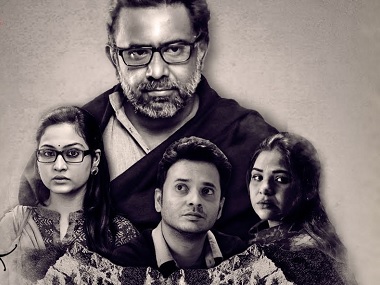In the study of organisms, the term ‘pupa’ refers to that life stage of an insect during which it undergoes a complete metamorphosis, changing from an immature living form into a living one. Director Indrasis Acharya calls his new film Pupa because the film is an excellent study of the many changes that people go through during a period of crisis – especially one that pertains to life and death. [caption id=“attachment_5105091” align=“alignnone” width=“825”] A still from Pupa. Image via YouTube[/caption] Shubhro is a techie living and working in America. When he hears the news of his mother’s death, he rushes back to India. His family – which includes his aged father, an elder sister and his father’s brother – are all in grief, but Shubhro doesn’t seem to express his grief as much as the others do. But before he can come to terms with his mother’s death and deal with his sorrow, Shubhro learns that his father has had a stroke and entered a comatose situation. The doctors give him 10-15 days at the most, and the family decides to bring him home, where he can pass into the great beyond with considerable ease. Strangely though, months pass by, but the man’s life just doesn’t seem to slip away. This creates a strange situation within the household, because now, the entire family is stuck with a man who has no sense or feelings whatsoever, and yet someone they have to care for. Shubhro keeps asking for extension of leaves, and his sister increasingly begins to find it difficult to come and care for her father, leaving her own daughter, husband and mother-in-law behind. Shubhro’s uncle is a well-educated, intelligent, scholarly, adventure loving, and extremely pragmatic man, and he advises both Shubhro and his sister Mou to move on with their lives after making necessary arrangements of care-giving for their father. While Mou sees merit in the advice, Shubhro is adamant to stay by his father’s deathbed – waiting for death to come and relieve the old man of a meaningless existence. While Pupa raises several important questions, it is abundantly clear that it is tilted towards practicality rather than emotion. Which is perhaps why, it is Rajat Chatterjee – Shubhro’s uncle, brilliantly played by Kamaleshwar Mukherjee – who is the real hero of the film. Rajat tells Shubhro that he has his whole life ahead of him and these are not times to be weak. The likeness of his arguments to the teachings of Lord Krishna in the holy text cannot be denied. Before the great war, when Arjun had refused to participate in battle, it was Krishna who had taught him several valuable lessons of life. In Pupa too, Rajat Chatterjee asks his nephew to open his eyes and be strong. Pupa is an intelligently written and directed film, and it is good to see that Indrasis Acharya has placed ample faith in his audience’s ability to draw the crux of the film’s message without him having to spoon-feed them. Technically too, the film scores high. The skillful cinematography, excellent sound design and a fitting background score – all of these lend an air of credence to the film, which then scores high with its tightly-woven plot and top-notch performances. Rahul Banerjee puts in a fantastic performance – his frustration seeping in through the very fabric of the screen. He knows what is the right thing to do under the circumstances, and yet he cannot bring himself to doing it. For him, his filial piety takes precedence over everything else, even his logic. His sister Mou (Sudipta Chakraborty in another knock-out role) however, is far more understanding. When she stands at the crossroads of life, trying to choose who to save – either her near-dead father or her own family – she doesn’t hesitate. It is the ease with which she makes such a tough decision that seems to frustrate Shubhro even more – as one by one, everyone leaves, and he is left alone to care for his father. But it is Kamaleshwar Mukherjee in the role of Shubhro’s uncle Rajat Chatterjee who steals the show. A man of great wisdom, his is the best written character in the film. Every single line he speaks adds on to his charismatic persona – one that makes us revere him. The film’s climax may have been slightly rushed, but this is a minor flaw that can be easily overlooked in an otherwise finely crafted piece of cinema. It makes a strong point for taking decisions on data points rather than on the basis of emotions. It is true that what the film offers is just an argument, but the fact that it does so with great conviction and sincerity is what makes Pupa a nice watch. I may not believe in the message that it seems to give me, but I would watch it again, in a heartbeat. That’s how powerful the film is.
Pupa is an excellent study of the many changes that people go through during a period of crisis – especially one that pertains to life and death.
Advertisement
End of Article


)
)
)
)
)
)
)
)
)



